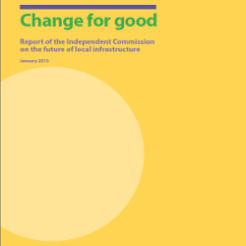Local infrastructure bodies in the social sector need to adapt to new technologies and find more creative ways of securing funding or risk being left behind, a Navca report has found.
In its final report Change for Good, the Commission on the Future of Local Infrastructure has called for local infrastructure bodies to “be redesigned and creatively resourced” if they are going to continue to properly serve their function within local communities.
Between April and December of 2014, the 20-strong commission, which was set up by Navca, heard evidence from local groups and infrastructure organisations concerned about how the social sector could continue to meet increasing demand with dwindling funding.
It has reached the conclusion that despite the fact that “infrastructure will be needed in some form for as long as people… form voluntary organisations”, many individual bodies must change their approach if they expect funders to continue to invest in them.
Sara Llewellin, chair of the commission and chief executive of Barrow Cadbury Trust, said: “Infrastructure needs to be financed, but it also has to undergo a redesign. It needs to be leaner, meaner and more technologically savvy. It needs to act as a lever bringing in new resources to the sector, including social investment, crowdfunding and pro bono support."
She added: "Above all, it needs to help the sector with foresight and managing change, because the pace of change is not going to slow.”
Local infrastructure bodies have also been called upon to “focus more on brokering relationships” with other “socially active organisations”, not only within local communities, but also “across… regional geographies”, in order to strengthen their influence and general say with local authorities.
It also warned that the social sector as a whole, especially at a local level, is “so busy coping with the problems of today that it often lacks the foresight to adapt to change effectively”. And that: “There is a limited understanding of social enterprise, social entrepreneurship and social investment.”
BIG should exert its influence
As well as the overarching call for a complete redesign the report, released yesterday, makes 19 further recommendations for commissioners, funders and infrastructure bodies.
The Big Lottery Fund (BIG) is highlighted specifically in one of the further recommendations.
The funder is called upon to use its “influential position as a funder of social action” to instigate a “roundtable, with funders and infrastructure bodies… to enable the redesign of infrastructure bodies”.
Longer-term funding for social action organisations and collaboration between different, independent funders in order to maximise their impact are also recommended.
The report outlines in no uncertain terms where it sees infrastructure organisations needing to go in the future. It said: “We see the future role of local infrastructure as a convener and broker, linking people and communities to resources, information and support.”
The commission was hesitant to outline how it would implement the recommended reforms, as “every place is different and redesign will only work if it is locally determined”.
Responding to the report Sir Stuart Etherington, chief executive of NCVO, said there are "no easy answers to many of the issues indentified" for infrastructure in the report, but vowed to "explore the full range of options to create a sustainable future".









